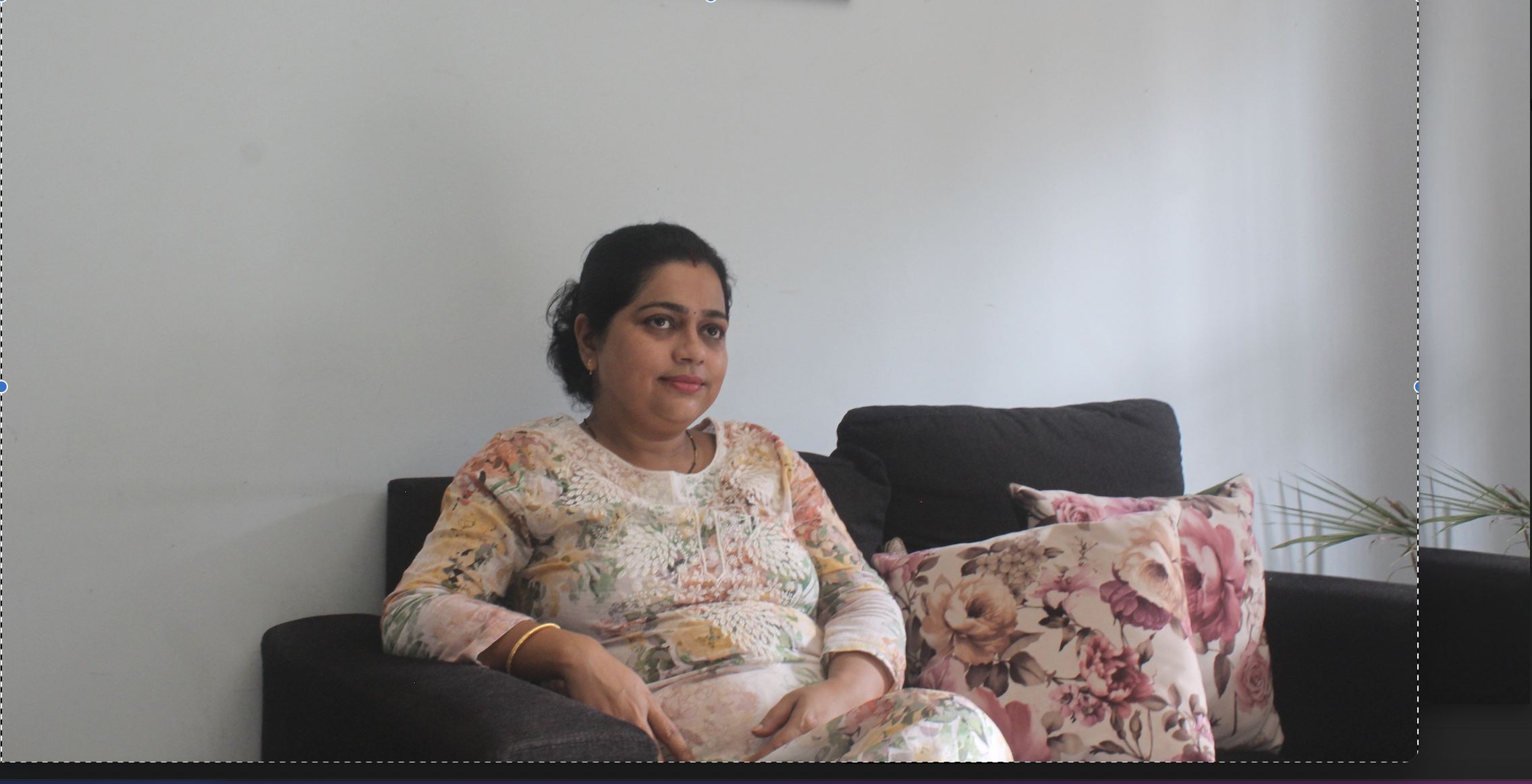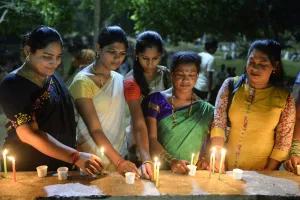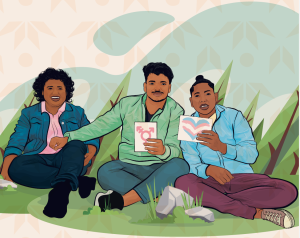What Parental Support Means For A 17-year-old Trans Girl In Assam
A trans girl in Guwahati battled hostility and harassment in her early school years but found strength in her parents’ unwavering support, love and care. Recently expelled from school for posting a bikini photo, her parents are pushing back
- Sanskrita Bharadwaj

On a hot summer day in June, Aashi* (name changed to protect her identity), a 17-year-old trans girl, sat in the living room of her home in Guwahati helping her mother answer calls from several journalists. Just a week before, Aashi had been asked to leave her school, South Point School, for sharing a photo of herself in a bikini on Instagram.
On June 9, the family went swimming and this was where the photo had been taken. “Aashi enjoys swimming a lot,” Indrani Chakraborty, Aashi’s mother, told Behanbox.
The day after the photo was posted, the principal of her school, K Chanda, called Aashi on her personal number after 9pm and asked if he could speak to Indrani. “He went on to tell me: ‘Your daughter is disgusting and shameful. Come tomorrow and take her out of the school. Whatever you paid as the admission fee will be refunded.’”
Around 11pm, the principal’s son and a faculty member, Rishvik Chanda, called Indrani. “He apologised for his father’s behaviour and told me that he doesn’t want Aashi to leave the school,” she said, adding that Rishvik had been a “strong ally” of her daughter who had been studying at the school since Class 4.
The next day when Indrani and her husband Moloy reached the school, the principal first refused to meet them. Instead, Aashi’s class teachers and Rishvik addressed the Chakrabortys, telling them that they do not want their daughter to leave the school. But, suddenly, the principal walked in and laid out the rules that Aashi would have to follow if she wanted to continue studying in his school.
Aashi would have to, he said, cover her tattoo and remove her piercings. She would also have to remove her photographs from her personal Instagram account. “I refused the demands and asked for her transfer certificate,” Indrani said.
The incident is a reflection of how difficult it is for a transgender child to navigate through school, but it is also a testament to her family’s own struggles. Indrani and Moloy Chakraborty’s support for their daughter’s gender choice is a rare example of what parental backing can mean to a minor transgirl in a tier-two Indian city.
Behanbox had previously reported here and here on how the lack of familial support has been a continuing problem for India’s LGBTQIA+ community.
When Behanbox got in touch with principal Chanda, he said that all their students have to abide by the school’s “code of conduct” and anyone who fails to do so would not be tolerated. “She had piercings and tattoos, and she had coloured her hair which we don’t allow,” he said, adding that “she had posted explicit photos” on Instagram which, too, he mentioned was unacceptable.
However Aashi’s family argued that the school’s rule book had no mention of these conditions till the incident. “So it almost feels like they updated the rules specifically after the incident with my child,” said Indrani.
Rituparna Neog, associate vice-chairperson of the State Transgender Welfare Board of Assam, pointed to the many problems with how the principal addressed the child. “Where did he get her number to call her at night because on the school records only the guardian’s number is available,” she said, adding that the principal went on to slut shame the student by calling her “disgusting and shameful”.
Indrani has registered complaints at the State Transgender Welfare Board, the National Commission for Protection of Child Rights (NCPCR) as well the Central Board of Secondary Education (CBSE). She now plans to ensure that Aashi does her Class 11 and 12 through open schooling and also continues with her regular therapy and counselling.
“I expect an apology from the principal because he has shamed my daughter, mentally harassed her and violated her right to education. She will be losing a year because this is mid-session,” she said.
A district commissioner’s hearing has taken place on the incident so far, along with a hearing from the child right’s commission. The case is currently in progress.
‘She Was Behaving Differently’
There were things that Indrani did not quite understand when Aashi was growing up, she said. “I felt that she was different,” she said, opening up on her journey to come to terms with her daughter’s gender identity.
When Aashi was around three-years-old, she asked her father for a “female dress”. “It was something like a belly dancer’s dress with shimmery stuff and her father got it for her. It made her so happy. She was very fond of my clothes and shoes. She had a wide collection of dolls and she always played with them,” Indrani recalled. “She would use my face creams and makeup. She would sit with her grandmother and watch serials, imitating the actresses, their style. She was very much into girly things.”
Indrani started looking for answers on why her child was behaving “differently” – was it a disease, a mental illness or someone’s influence? “We also wondered if she was possessed. We went to a faith healer,” she said. But then she started researching. “I came to know that it is very natural. She is my child, whether a ‘he’ or a ‘she’, she will always be accepted,” she said.
But, she was also petrified about how society would react. “I was somehow taken over by this fear of losing my child.” Aashi was born after she had suffered four miscarriages. “Perhaps our bond is so strong because I had to struggle to have a child. I suffered a lot so when she was born, I swore I would protect her no matter what,” she said.
Till she reached Class 9, Aashi said she found her growing years “suffocating”. She wore a boy’s uniform in school and behaved in a “masculine manner” in order to fit in. “My room was my safest place–it was where I could express myself and feel at peace. This ‘me time’ was my most favourite time–I could dance, sing, wear makeup. I could do whatever I wanted to,” she told Behanbox.
‘Ma, I Want To Be Like You’
Indrani recalled an incident when Aashi was assaulted by a staff member at the Happy Child School in Guwahati when she was in Class 3. “There too, the principal was extremely insensitive. I was told: ‘Your son behaves like a girl, that’s why the peon has done these things.’ That case is still ongoing. Then we changed her school and brought her to South Point School,” she said.
When she was 10, Aashi told her mother that she wanted to watch an episode of Aamir Khan’s show Satyamev Jayate which featured trans woman Ghazal Dhaliwal, a filmmaker and screenwriter as the guest. “That was the first time I saw that even a trans girl can live a normal life,” said Indrani. “One day I asked her–‘do you want to be a girl?’ Then she plainly answered– ‘Ma, I want to be like you. That moved me.”
Aashi recalled searching Google for information about gender from an early age. “I knew the terms through the internet. I used to search for the answers to the question, why was I different. I was occupied with that thought. I felt lonely, I didn’t really have friends back then. I was bullied and felt isolated,” she said.
In 2021, when Aashi was in Class 8, she said she went through a phase of behaving and dressing in an overtly masculine manner. “The lockdowns and the pandemic made it worse. She was depressed and bed-ridden during that period,” Indrani said. “Then one day, she took a knife in her hand, and said, ‘I do not like my body. You people think I am a boy but I am not a boy, I am actually a girl’.”
The incident rattled the family. They consulted with a lot of psychiatrists, counsellors and dealt with a lot of misguided counsel. “The problem with us was we did not have the awareness or knowledge. I thought there might be some hormonal problems, so I thought of visiting an endocrinologist and that man changed our lives,” said Indrani.
Guwahati-based endocrinologist Samiran Das heard them out patiently. “He told us: you thought that you had a son, but you have a daughter’.”
The doctor told the family about an entire team that would put Aashi through a psychological evaluation at the Gauhati Medical College and Hospital (GMCH) to check if she was dysphoric so she could be issued a certificate to this effect. This certificate is necessary for a person to undergo hormone replacement therapy (HRT) also known as gender-affirming hormone therapy (GAHT). This therapy is a part of gender-affirming care. It’s prescribed to encourage physical changes in the body to help people live their authentic selves with respect to their gender identity.
With the encouragement of Das and psychologist Mythili Hazarika, the Chakrabortys also went ahead with an affidavit to establish a new name and gender for Aashi. “This was after the pandemic, and the classes had just started. Aashi was in Class 9. We informed the principal about these changes, and requested that these be also reflected in the school records. Initially, the principal told us to get these changes done after Aashi finishes her Class 12 but I resisted and insisted because I know that I have a daughter and I wanted her to grow like a girl,” Indrani said.
Bullying And Harassment
While navigating a barrage of emotions, Aashi found unwavering support, care and help from her parents and this she said gives her strength and confidence. At school, though some teachers were supportive, she was “bullied and harassed a lot”. “But I started standing up for myself because I had the support of my parents,” Aashi said.
According to Indrani, Aashi was once asked by some students to take her clothes off and this depressed her so much that she stopped going to school. “We reported everything but students who were responsible for assaulting her were just given a warning and let go,” she said.
By the time Aashi was in her Class 10, she had “created a shield around her”, said her mother. But there was more harassment to come: “She was bullied in Class 10 as well but she learnt to cope with it. She faced harassment from the guardians of the fellow students who used to call her names. They didn’t want their children to be with her.”
When Behanbox asked principal Chanda about these allegations of assault, bullying and harassment, he denied them, only referring to the possibility of “teasing”.
Aashi’s mother talked of her daughter’s potential and how the hostility she faced did not allow her to bloom. “She was also made the class prefect by her class teacher so that she gets that ‘equal status’. But people were jealous; they created a lobby. They were always after her life, trying to find fault with her so that she could be kicked out of the school,” alleged Indrani.
Aashi managed to score a 78% in her Class 10 exam though she had stopped attending school because of the harassment. She did this on her own, without any tuition or help. She had taken up humanities in Class 11 and had barely attended school for three days when the June 10 incident occurred.
According to Moloy, those three days were like “hell” for their child. “The principal used to call her to his office and insult her on her appearance,” he said. “The tattoo which the principal wanted her to cover up with a full-sleeve shirt was done in consultation with her counsellor and the school in order to hide her self-harming marks,” he said. “And it was done when she was in Class 9, so why is the school creating an issue now?”
The family said they were planning to change her school because of its “toxic” environment when the principal asked Aashi to leave.
Neog of the State Transgender Welfare Board said that in view of reports about predatory behaviour on social media, Aashi’s photo post could have been avoided. But this was something about which the counsellor could have had a conversation with her without the principal’s moral policing, she added.
Neog also wrote a letter to the principal, demanding an apology from him. In response to the letter, Chanda said that the photo was “sexually explicit”. “It means that he and the school have sexualised the child’s photo,” Neog noted, adding that the entire incident reeked of transphobia. “For them it is a headache to have a transgender child in their school.”
We believe everyone deserves equal access to accurate news. Support from our readers enables us to keep our journalism open and free for everyone, all over the world.




